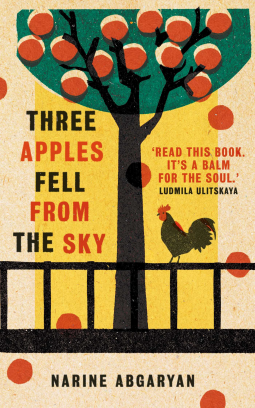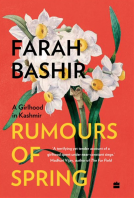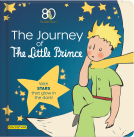
Three Apples Fell from the Sky
The International Bestseller
by Narine Abgaryan
This title was previously available on NetGalley and is now archived.
Send NetGalley books directly to your Kindle or Kindle app
1
To read on a Kindle or Kindle app, please add kindle@netgalley.com as an approved email address to receive files in your Amazon account. Click here for step-by-step instructions.
2
Also find your Kindle email address within your Amazon account, and enter it here.
Pub Date 4 Aug 2020 | Archive Date 5 Mar 2020
Talking about this book? Use #ThreeApplesFellfromtheSky #NetGalley. More hashtag tips!
Description
The Russian bestseller about love and second chances, brimming with warmth and humour
In the tiny village of Maran nestled high in the Armenian mountains, a place where dreams, curses and miracles are taken very seriously, a close-knit community bickers, gossips and laughs, untouched by the passage of time. A lifelong resident, Anatolia is happily set in her ways. Until, that is, she wakes up one day utterly convinced that she is dying. She lies down on her bed and prepares to meet her maker, but just when she thinks everything is ready, she is interrupted by a surprise visit from a neighbour with an unexpected proposal.
So begins a tale of unforeseen twists and unlikely romance that will turn Maran on its head and breathe a new lease of life into a forgotten village. Narine Abgaryan's enchanting fable is a heart-warming tale of community, courage, and the irresistible joy of everyday friendship.
Advance Praise
‘Read this book. It's balm for the soul.’ Lyudmila Ulitskaya, author of The Big Green Tent
‘Suffused with kindness, humour, subtlety and understated finesse.’ Eugene Vodolazkin, author of Laurus
‘Read this book. It's balm for the soul.’ Lyudmila Ulitskaya, author of The Big Green Tent
‘Suffused with kindness, humour, subtlety and understated finesse.’ Eugene Vodolazkin, author of Laurus
Available Editions
| EDITION | Other Format |
| ISBN | 9781786077301 |
| PRICE | US$16.95 (USD) |
Featured Reviews
 Fran E, Reviewer
Fran E, Reviewer
Anatolia Sevoyants, fifty-eight years old, lived in Maran, an isolated Armenian village. Convinced she had a fatal illness, she pulled her "grave clothes out of the wardrobe,...opens windows so her soul...could free itself and dart heaven bound...". However, she easily fell asleep then "soaked up the morning sun with her whole being".
Life in Maran had not been easy for Anatolia. She was married for eighteen unhappy years to a man who was callous and indifferent. Reading was her only outlet. Having become the village librarian, she decorated the library by adding colorful curtains and bench cushions creating a "coziness and lightness...reminiscent of a reading room in a well-tended conservatory".
Maran used to be a farming community containing arguably five hundred households. On Saturdays, villagers gathered to barter their products. "You might receive a knife for ten hen's eggs...". Gypsy caravans traveled up the perilously narrow slope of the Manish-kar mountains in order to trade. Plagued by earthquakes, war, famine and drought, many villagers chose to move down to the valley. "The village clung onto Manish-kar's shoulder like a burdensome weight, pointless and forgotten by everyone", that is, except for the older citizens who didn't want to leave the land settled by their ancestors. "Every Maranian knew the ins and outs of their fellow villagers...their misfortunes, hurts, illnesses, and rare, but very long-awaited joys...Anatolia couldn't figure out why ...Vasily...[wanted]...to ruin that measured way of life...".
"Three Apples Fell from the Sky" by Narine Abgaryan is a literary novel describing the trials and tribulations of a dwindling population in a remote Armenian village. The villagers were congenial, sympathetic, cantankerous and loved to gossip. Their insular world was connected to the world at large via an ancient telegraph wire. Maran's residents engage the reader by sharing their memories, feats of resilience, bouts of stubbornness and love of humor. An excellent tome I highly recommend.
Thank you Oneworld Publications and Net Galley for the opportunity to read and review "Three Apples Fell from the Sky".
I really liked how this story was told, it had just the right mix of sad and sweet, beauty and ugliness, mundane and fantastical, to make the village come alive in vivid detail. It was cozy and charming to be escorted into this world and spend time with its characters.
 Reviewer 593259
Reviewer 593259
Three Apples Fell From the Sky is a book in which the setting ultimately feels like the central character of the story. The descriptions of Maran, an isolated and aging village in the mountains of Armenia, are vivid and one of the book’s greatest strengths. While there are obvious effects of conflicts and world events in Maran, Abgaryan makes them feel very remote. There is an insularity to this book that I found unusual and that I really enjoyed. I kept expecting turns into politics and history, but Abgaryan consistently prioritized characters and place.
One thing I found somewhat challenging about the writing was that organization. For example, a section that focused on one character would switch into a long remembrance about another without much indication that there was a sidetrack that was about to occur. I found there were a lot of characters and it wasn’t always easy to connect back to names of previously minor characters when they became the focus later in the book. This isn’t to say that the book was confusing, but it demands some attention and I had to do some rereading to sort out some of the relationships. The organization seemed more to me like vignettes of people and events in Maran, though there is some structure in the returning to Anatolia.
Three Apples Fell From the Sky is a bittersweet book that feels a visit to Maran visiting its elderly residents and hearing their stories about the village.
 Malvika J, Reviewer
Malvika J, Reviewer
This book was utterly beautiful. After many days, here was a book that made you smile and smoothed your brow and wrenched your heart and even made you shed a tear or two. It was all things that make for wonderful reading.
So, first things first. That cover is so typical of those Soviet years missed sorely by readers around the world from the time when we read umpteen number of translated Russian books in various Indian languages. The beautiful, dark stories and those gorgeous illustrations at such affordable prices. This cover is a throwback to that time and does full justice to the book. Although would a white peacock have been more emotive of the story? Nitpicking here.
The title is part of an Armenian folk tale/ adage, it is not clear which. The author explains it at the end which turns into an 'Aha' moment because I spent the whole book trying to understand where the title came from. When you search this title, there are quite a few other entries that pop up on Google which only solidifies the importance of this proverb/ folk tale/ adage and of storytelling in Armenian culture.
The story is that of a small Armenian mountain village, now peopled by a clutch of old folks. The author takes us through the histories of almost each resident and makes them come alive. There are tragedies, there are superstitions, there is downright magic, there are super miracles that occur in this tiny village. And the residents take it all in their stride with a philosophy that is stoic and matter-of-fact. The most affecting scene has to be that of the disposal of the yeast packets. It is genius in its simplicity and can probably be thought up only by someone who has witnessed something like this happen in real life.
It’s a small novel and a slow one. It needs to be paced out and savored. It made me want to look up more translated contemporary novels from the former Soviet republic, for it made me realize what I have been missing for the past few decades. To try and find out what the present day east European is thinking – are they still the boisterous, uber fatalistic writers of a hundred years ago or are things lighter and shinier in their writing now. This book, although it deals with so much tragedy and loss, also carries with it a message of so much hope and happiness.
The translation is extremely well done. At no point did it feel that the translator failed to convey what the author was trying to accomplish by her words.
Definite recommendation for all who like a story that deals with life in small communities and is open to accepting the idiosyncrasies and foibles of their inhabitants, along with their generosity and straight-forwardness.
 Andrea R, Reviewer
Andrea R, Reviewer
And three apples fell from heaven:
One for the storyteller,
One for the listener,
And one for the eavesdropper.
This old Armenian saying provides the structure for this mostly quiet, gentle story of family, friendship, tradition, endings and beginnings. Originally published in the Russian language in 2015, it has now been flawlessly translated into English by Lisa C Hayden.
Anatolia is one of the youngest residents of Maran, a remote, isolated village on the slopes of the Armenian mountain, Manish-kar. In her late 50s, she has outlived her immediate family by decades - even her abusive husband has been gone for more than 20 years - and in poor health, she is ready to die. But fate, and another villager, have different plans for her, and day after day Anatolia awakes to find she is still amongst the living. Her elderly neighbours, who remember her parents fondly, are a great support to Anatolia, and encourage her to accept the new direction her life seems to be taking.
In another part of the village, Vano and Valinka dote on their grandson Tigran, the only surviving infant born during the famine. He lost his own parents, so he developed a strong and close bond with his grandparents, who don't want to (but can't help) believing that the little boy's fate is somehow tied to the grumpy, snow-white peacock that came into their care at around the same time.
In the most surprising way, these two families are brought onto the same path to provide some hope for the village's future.
This book is really special. It reads like a fairy-tale with little sprinklings of magical realism to keep the story moving forward. I loved the pace of the story, which matched exactly the pace of village life, where everything is done by hand and life is lived largely at the mercy of nature. There are a lot of characters to keep track of - both living and dead - and I just adored them all. I have no doubt that I will re-read it at some point (and perhaps create my own little mudmaps so I know which ancestors belong to which current villagers).


















